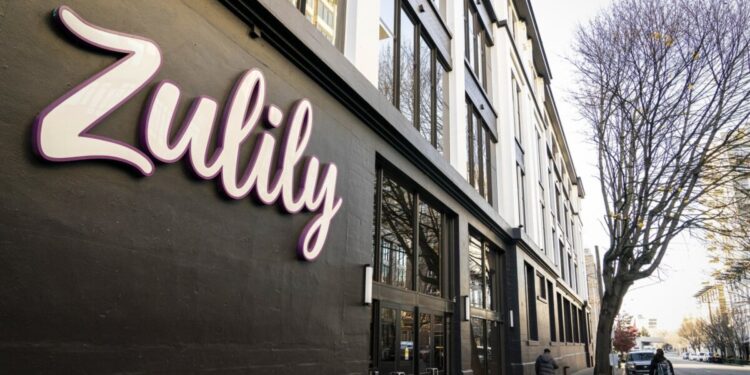Zulily may no longer dominate Seattle’s tech scene, but physical pieces of the online retailer will continue serving the community through Evergreen Goodwill facilities across the region.
Hundreds of office chairs, desks, kitchen appliances, IT equipment, and more have been donated to Goodwill by Vanbarton Group, a commercial real estate investment firm that now owns the former Zulily building at 2601 Elliott Avenue.
Vanbarton plans to convert the building, which occupies a full block near the waterfront, into 262 apartments, according to reports from July.
A once-prominent online retailer, Zulily was a darling of Seattle’s growing tech scene when it reached a $4 billion valuation following its IPO in 2013. But after QVC parent Qurate paid $2.4 billion to acquire the company in 2015, it was sold to Los Angeles investment firm Regent in May 2023 and eventually shut down.
In March, Zulily gained a new owner for the third time in two years when Beyond, which emerged as a surprise buyer in 2024, announced plans to sell a majority stake in Zulily to Lyons Trading Company, the parent company of flash sales site Proozy.com.
Evergreen Goodwill said in a news release that the donation, facilitated by Vanbarton Group’s outreach, saved the nonprofit an estimated $100,000 in equipment costs and diverted valuable resources from landfills.
The office items are being repurposed in multiple locations, including Goodwill’s new Georgetown operations center, scheduled to open this fall, and job training and education centers that it operates in five counties.
Remaining items will be sold in Goodwill stores, with proceeds supporting free job training and education programs for people facing barriers to employment, according to Goodwill.
The hundreds of office chairs, desks, and kitchen appliances donated by Vanbarton Group represent the physical remnants of Zulily’s once-thriving Seattle headquarters, transforming corporate infrastructure into community resources serving job training programs.
The 2601 Elliott Avenue location near the waterfront occupies prime real estate in Seattle’s Belltown neighborhood, with the full-block building’s conversion to 262 apartments reflecting the city’s ongoing transformation from commercial to residential space.
Vanbarton Group’s donation rather than selling equipment or disposing through liquidators demonstrates corporate social responsibility that benefits both the real estate firm’s reputation and Goodwill’s operational capacity.
The $100,000 estimated savings in equipment costs represents substantial financial relief for Evergreen Goodwill, a nonprofit perpetually challenged to stretch limited budgets across five-county service areas including King, Snohomish, Kitsap, Whatcom, and Skagit.
The landfill diversion aspect addresses environmental concerns where disposing functional office furniture contributes to waste streams, with donation enabling reuse that extends equipment lifecycles and reduces manufacturing demand for replacement items.
The Georgetown operations center opening this fall will house Goodwill’s administrative functions and potentially warehouse space, with Zulily’s donated desks and chairs furnishing offices where staff coordinate job training and retail operations.
The job training and education centers across five counties serve individuals facing employment barriers including criminal records, disabilities, homelessness, or limited English proficiency, with Zulily’s equipment supporting classrooms and computer labs.
The remaining items sold in Goodwill stores will generate revenue supporting the organization’s mission, with shoppers purchasing former tech company furniture at affordable prices while funding workforce development programs.
Zulily’s $4 billion 2013 IPO valuation represented the company’s peak when flash sales e-commerce thrived and investors viewed the Seattle startup as a sustainable competitor to Amazon and other online retailers.
The Qurate acquisition for $2.4 billion in 2015 signaled declining confidence in Zulily’s independent prospects, with the QVC parent paying substantially below the IPO valuation reflecting either buyer negotiation leverage or realistic assessment of competitive challenges.
The May 2023 sale to Los Angeles investment firm Regent followed by eventual shutdown demonstrates private equity’s typical pattern of acquiring distressed assets, attempting turnarounds, and liquidating when revival proves impossible.
The March ownership transfer to Beyond followed by majority stake sale to Lyons Trading Company represents Zulily’s third ownership change in two years, illustrating the brand’s diminished value as it passed between increasingly smaller buyers.
Beyond’s surprise 2024 emergence and subsequent stake sale to Proozy.com’s parent company suggests attempts to merge Zulily’s customer base and technology into existing flash sales operations rather than reviving it as a standalone entity.
The Elliott Avenue waterfront proximity places the former headquarters in a neighborhood experiencing rapid redevelopment, with industrial and office buildings converting to residential use as Seattle’s housing crisis drives apartment construction.
The 262-unit apartment conversion represents typical Seattle development patterns where commercial buildings become housing, though the scale suggests luxury or market-rate units rather than affordable housing given the waterfront location’s premium real estate values.
The donation facilitated by Vanbarton Group’s proactive outreach indicates the firm contacted Goodwill rather than waiting for nonprofit requests, suggesting corporate commitment to community benefit beyond the minimum legal requirements for property redevelopment.
The five-county Evergreen Goodwill service area encompasses the Puget Sound region’s major population centers, with donated equipment potentially distributed from urban Seattle facilities to rural Whatcom and Skagit County locations serving smaller communities.
The job training program support funded by store sales aligns with Goodwill’s core mission, with Zulily’s former office equipment creating circular benefit where corporate castoffs enable workforce development that reduces unemployment and poverty.
Seattle’s tech sector contraction exemplified by Zulily’s collapse and headquarters conversion to apartments reflects broader industry challenges where pandemic-era growth reversed, causing layoffs and office vacancies throughout the region.







